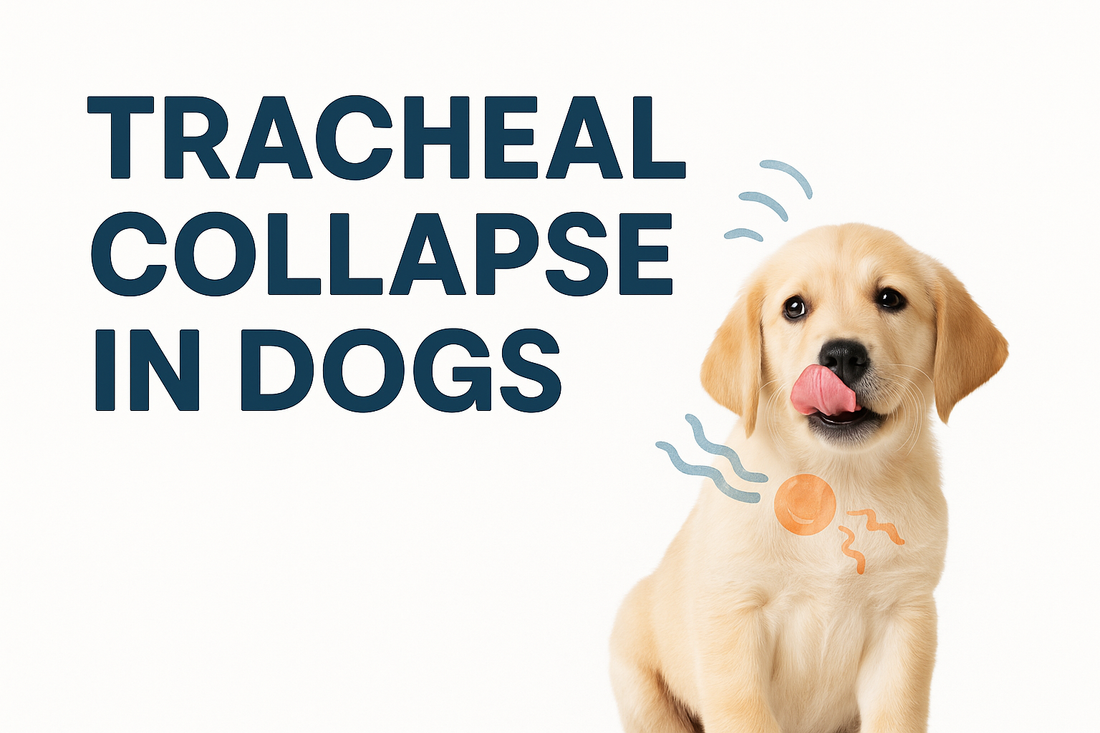
🐶 Tracheal Collapse in Dogs – Symptoms, Causes, Treatment, and Care Guide
Tracheal Collapse in Dogs – Symptoms, Causes, Treatment, and Care Guide
What Is Tracheal Collapse in Dogs?
Tracheal collapse is a chronic respiratory condition in which the tracheal (windpipe) rings—made of cartilage—weaken and flatten, narrowing the airway and making it difficult for dogs to breathe.
It is most commonly seen in small-breed dogs such as Yorkies, Pomeranians, Chihuahuas, and Toy Poodles.
This is a progressive disease, meaning symptoms worsen over time, and early diagnosis and proper management are crucial.
🚨 Common Symptoms of Tracheal Collapse in Dogs (Focus Keyword)
-
Dry, honking cough (often described as a “goose honk”)
-
Coughing or wheezing during excitement or exercise
-
Cough triggered by collar pressure
-
Frequent throat licking or gagging
-
Retching or coughing after eating or drinking
-
In severe cases: cyanosis (blue gums), fainting, or respiratory distress
🧬 Causes and Risk Factors
-
Congenital weakness of tracheal cartilage
-
Obesity – increases pressure on the airway
-
Aging – older dogs have weaker tracheal structures
-
Repeated trauma to the neck (from pulling on a leash or using collars)
-
Exposure to smoke, dust, or airborne irritants
-
Chronic bronchitis or concurrent respiratory conditions
🔍 How Tracheal Collapse Is Diagnosed
-
Physical exam and stethoscope to detect abnormal airway sounds
-
Chest X-rays to visualize the shape of the trachea
-
Tracheoscopy or fluoroscopy (dynamic imaging) for accurate staging
💊 Treatment Options for Tracheal Collapse
1. Medications
-
Bronchodilators to open airways
-
Cough suppressants to relieve irritation
-
Anti-inflammatories to reduce swelling
-
Antibiotics if secondary infections are present
2. Weight Management
-
Reducing excess body weight is one of the most effective ways to relieve airway pressure.
3. Use of a Harness
-
Avoid collars. Switch to a soft, padded chest harness to prevent pressure on the neck.
4. Environmental Modifications
-
Eliminate exposure to smoke, dust, aerosol sprays, and strong fragrances
5. Surgical Options
-
In severe or advanced cases:
-
Tracheal stent placement
-
Surgical reinforcement of the tracheal rings
-
⚠️ Surgery is typically reserved for non-responsive, severe collapse.
🛒 Helpful Products for Tracheal Health
-
No-pull chest harnesses for small breeds
-
Respiratory support supplements with natural anti-inflammatories
-
Air purifiers for reducing indoor allergens and irritants
👉 Explore Dog Tracheal Health Products
External Resource (DoFollow)
More information: American College of Veterinary Internal Medicine – Tracheal Collapse
Internal Resource
👉 Related article: Mitral Valve Disease in Dogs – Symptoms, Treatment, and How to Manage It
🧩 Frequently Asked Questions (FAQ)
Q1. Can tracheal collapse be cured?
A1. No, tracheal collapse is not curable, but it can be effectively managed with medication, lifestyle changes, and in some cases, surgery.
Q2. What precautions should I take during walks?
A2. Avoid using neck collars—always use a soft harness.
Limit walks during hot weather and avoid overly strenuous activity.
Q3. When should I take my dog to the vet for coughing?
A3. If coughing lasts more than a day, worsens with exercise,
or if your dog is breathing heavily or shows signs of cyanosis (blue gums), see a vet immediately.
🥦 Recommended Foods and Nutrition Tips for Dogs with Tracheal Collapse
While there is no specific "cure" for tracheal collapse through diet alone,
certain foods and feeding habits can help reduce inflammation, support respiratory health, and maintain a healthy weight — all of which are crucial in managing this condition.
✅ Best Foods for Tracheal Health Support
-
Lean proteins (e.g., chicken, turkey, white fish)
→ Help maintain muscle mass without adding unnecessary fat -
Omega-3 rich foods (salmon, sardines, or fish oil supplements)
→ Naturally reduce inflammation in the airways -
Pumpkin and sweet potatoes
→ Rich in antioxidants and fiber, good for digestion and immune health -
Blueberries and dark leafy greens (steamed spinach or kale)
→ Packed with vitamins C and E, which can help reduce oxidative stress in the lungs -
Probiotics and prebiotic fibers
→ Improve gut health, which supports overall immune and respiratory resilience -
Hydration-focused foods (like soaked kibble or wet food)
→ Ensure proper hydration, which helps maintain mucus flow and ease breathing
⚠️ Feeding and Lifestyle Precautions
-
Avoid high-fat or processed treats
These can contribute to weight gain and inflammation, worsening symptoms -
Watch portion sizes carefully
Obesity puts extra pressure on the trachea — even small gains can worsen breathing -
Minimize allergens in food
If your dog has sensitivities, choose a hypoallergenic diet to avoid immune-triggered airway inflammation -
Don’t feed right before exercise or walks
Give time to digest to prevent coughing or airway irritation -
Consider feeding smaller, more frequent meals
This can reduce bloating and pressure near the chest
🐾 Extra Tip: Diet as Long-Term Prevention
A low-inflammatory, antioxidant-rich diet, combined with proper weight management,
can reduce the severity of symptoms over time and help your dog breathe more comfortably.

